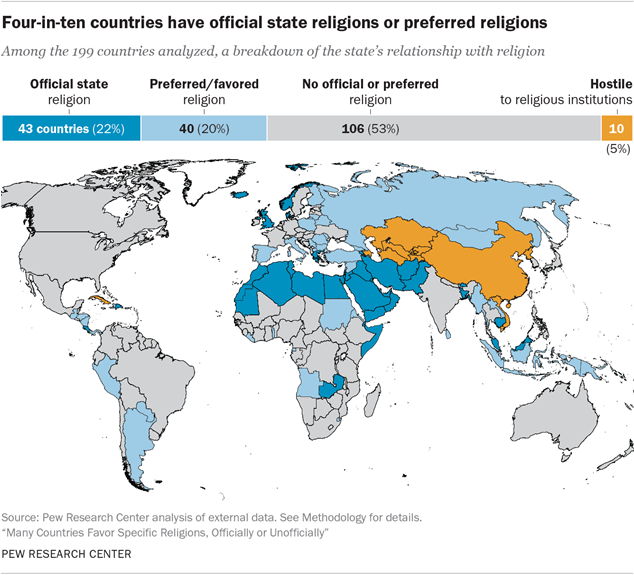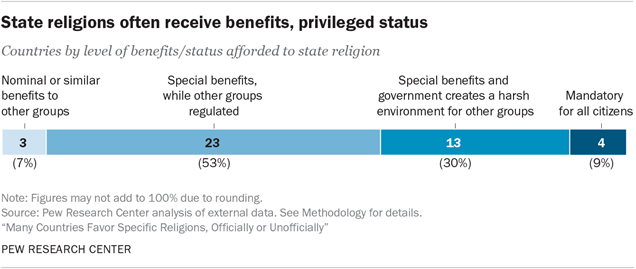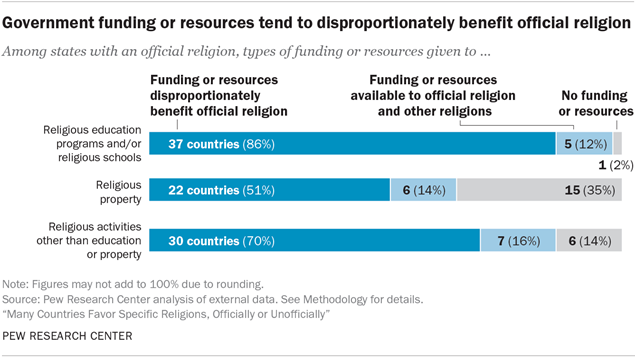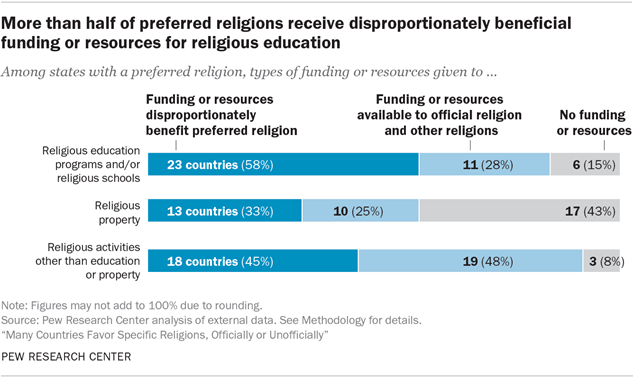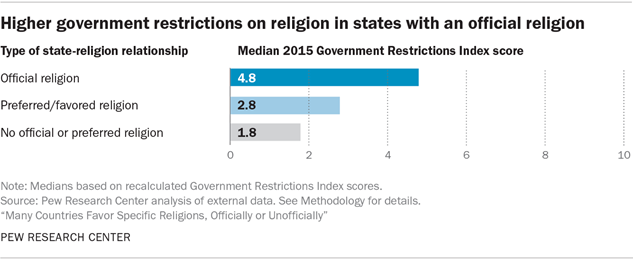Are 'state religion' and 'official religion' the same things?
For example, Pakistan has state religion while Sri Lanka has official religion.
On https://en.wikipedia.org/wiki/State_religion , it appears to me that these two words are used interchangeably.
Also, if these two are different concepts, then what exactly is the difference?
-
I guess that the sample is too small, and that translation problems are too big, to make the classifications you want. Any study would first have to define a distinction before it goes to analyze things. Consider the Vatican, one of the few remaining theocracies, or the US state of Massachusetts, which has a "state flower" and a "state fish" -- surely the choice of religion for the vatican is much more relevant that the choice of flower for an US state ...– o.m.Commented Dec 24, 2019 at 10:56
-
I might be way off here, but would the Church of England count as a state religion (since the queen is the official head of it) that is not the official religion (since people are free to choose any religion and the state doesn’t put pressure on people to join the COE)?– divibisanCommented Dec 24, 2019 at 19:27
-
@divibisan UK does in fact have christianity as its official religion.– mathematherCommented Dec 25, 2019 at 5:51
-
@divibisan the two terms are effectively synonyms in colloquial usage. Whether a religion is the "state" religion or "official" or "established" (as the Church of England is in England but not the rest of the UK) is not necessarily predictive of the degree of religious freedom. Mathemather: I'm not sure that the statement about Christianity being official in the UK is quite accurate. There are various established churches in constituent countries, but I don't think they use the term "official" formally. One could argue from the Acts of Settlement that Protestantism is informally official.– phoogCommented Dec 26, 2019 at 16:53
2 Answers
Wikipedia uses the two terms interchangeably. More important is that
The degree to which an official national religion is imposed upon citizens by the state in contemporary society varies considerably; from high as in Saudi Arabia to minimal or none at all as in Denmark, England, Iceland, and Greece.
which is not reflected in the terminology though. For that you'd have too look at some religious freedom index, e.g. one (by Pew) is given as a map on another Wikipedia page.
In 2013, Pew classified 30% of countries as having restrictions that tend to target religious minorities, and 61% of countries have social hostilities that tend to target religious minorities. [...]
The countries in North and South America reportedly had some of the lowest levels of government and social restrictions on religion, while The Middle East and North Africa were the regions with the highest. Saudi Arabia, Pakistan and Iran were the countries that top the list of countries with the overall highest levels of restriction on religion. Topping the Pew government restrictions index were Saudi Arabia, Iran, Uzbekistan, China, Egypt, Burma, Maldives, Eritrea, Malaysia and Brunei.
Of note is that China which doesn't have a declared official/state religion imposes high restrictions on religion freedom.
And just that aspect (of religious freedom) might be too simplistic to capture the full spectrum of state involvement in religious life.
Comparative law studies often take for granted the existence of a spectrum of models running from an antagonistic relationship to a very close relationship between state and religion. Such a one-dimensional perspective, however, will be found to be too simple (section 2). One can distinguish at least three dimensions: religion’s role in state matters (section 3); government’s role in the religious domain (section 4); and the relationship between state and religion in several other domains, such as the formation of political opinion (section 5), the social service sector (section 6), and the field of education (section 7).
See also Is there an index of state support for (the official) religion?
Pew has another (relatively simple) index which divides the world's countries in in four categories:
I'll quote their comments on the first two of them, which are most relevant to your question
In some cases, state religions have roles that are largely ceremonial. But often the distinction comes with tangible advantages in terms of legal or tax status, ownership of real estate or other property, and access to financial support from the state. In addition, countries with state-endorsed (or “established”) faiths tend to more severely regulate religious practice, including placing restrictions or bans on minority religious groups.
But an additional 40 governments around the globe unofficially favor a particular religion, and in most cases the preferred faith is a branch of Christianity. Indeed, Christian churches receive preferential treatment in more countries – 28 – than any other unofficial but favored faith. [...] These countries may or may not mention the favored religion in their constitution or laws; if they do, it is often as the country’s “traditional” or “historical” religion (but not as the official state religion).
So, yeah, going by the official terminology (from constitutions etc.) isn't always informative. Pew does further break down the first category (of countries with official/state religions) by level of support & coercion.
The countries in their second big category of a "favored" religion are more spread in terms of support:
... and (as a group) have somewhat lower intolerance to other religions.
-
Subject to some flexibility in the (controversial) definition of religion, China does have a state religion, which is atheism. At least "the government of China officially espouses state atheism," according to Wikipedia.– phoogCommented Dec 26, 2019 at 16:44
Keep in mind when asking these questions that you are asking about the legal meaning of these terms in English, whereas they may be merely translated from the official language of the country. Pakistan uses English and Urdu as official languages, while Sri Lanka doesn't officially use English. So there is a little bit of leeway and inexactitude due to the translation process and that will make it hard to generalize.
It's like those endless discussions we have here on Communism vs Socialism where (some) US English speakers want to prescribe how everyone else should interpret the word Socialism, despite it being used in multiple European languages.
Terminology is important, yes, but as this website attracts contributors from, and addresses questions pertaining to, around the world, it is important not to be over-reliant on dictionary definitions from one language. Or indeed even English Wikipedia's position on the subject.
This same question, applied to the status (or not) of say Christianity in the US, would not have much translation-related uncertainty and we could, as Fizz suggests, consider them to be broadly interchangeable.
So, I would say that we are unlikely to learn much about the actual differences between Pakistan and Sri Lanka's preferences for their religions based on those 2 terms. You have to compare the actual laws' content, interpretation and enforcement. Which is, btw, exactly what Fizz did.
